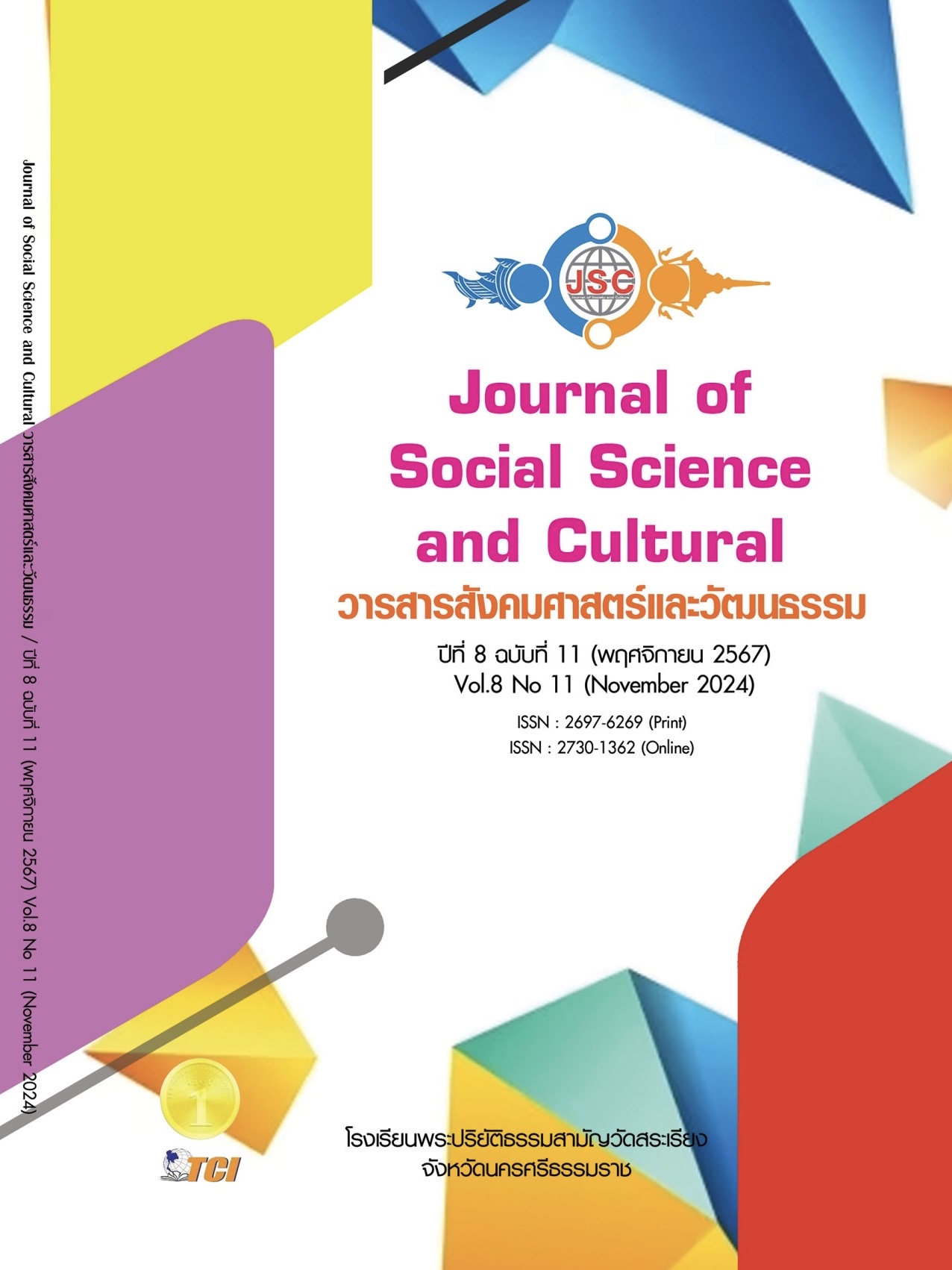THE DEVELOPMENT OF FLOATING MARKETS FOR PROMOTING COMMUNITY-BASED TOURISM UNDER THE NEW NORMAL IN SONGKHLA PROVINCE
Main Article Content
Abstract
This research article is a qualitative study with three main objectives 1) To analyze the knowledge related to the development of floating markets for promoting community-based tourism under the new normal, 2) To develop floating markets for promoting community-based tourism under the new normal in Songkhla province, and 3) To establish a network of partnerships for the development of floating markets to promote community-based tourism under the new normal in Songkhla province. The researcher conducted in-depth interviews with 25 key informants, consisting of 4 floating market managers, 5 local leaders, 4 tourists, 5 consumers,
5 vendors, and 2 marketing scholars. The target group for action research included 3 floating market managers, 5 tourists, 10 vendors, 10 consumers, and 2 general citizens, making a total of 30 participants. The sample group was selected using purposive sampling, focusing on individuals related to floating markets and community-based tourism. The findings revealed that the development of the Khlong Hae Floating Market in Songkhla province significantly boosted the local economy after the COVID-19 pandemic by preserving cultural heritage, promoting tourism, and enhancing the economic value of the community. Key improvements included infrastructure upgrades such as road expansion, parking management, waterway cleaning, and increased market safety. Additionally, organizing tourism promotion activities helped enhance the market's appeal to tourists. Establishing a network of collaboration between government, private sectors, and the community was crucial for the sustainable development of the floating markets. This involved using mass media and social media for effective promotion, attracting tourist interest, and raising awareness and understanding about the floating markets, with a focus on community participation.
Article Details
References
กรมควบคุมโรค กระทรวงสาธารสุข. (2563). โควิด-19: COVID-Free Setting มาตรการเชิงบังคับรับคลายล็อก 1 ต.ค. กับแผนกระตุ้นให้ฉีดวัคซีน. เรียกใช้เมื่อ 30 พฤศจิกายน 2565 จาก https://www.bbc.com/thai/thailand-58719544
คะนอง เขียวรัตนา. (2566). การพัฒนาชุมชนในยุคดิจิทัล. (พิมพ์ครั้งที่ 2). กรุงเทพมหานคร: สำนักพิมพ์ วิทยาการ.
ทวีศักดิ์ ตรีเลิศ. (2 พ.ย. 2566). ผู้ซื้อสินค้าในพัฒนาตลาดน้ำ. (ประสิทธิ์ รักนุ้ย, ผู้สัมภาษณ์)
นวันวัจน์ แข่งขัน. (2567). การพัฒนาศักยภาพการท่องเที่ยวชุมชน Otop นวัตวิถี บ้านสระยายชี ตำบลเนินปออำเภอสามง่าม จังหวัดพิจิตร. วารสารมจรเพชรบุรีปริทรรศน์, 7(2), 97-109.
พิมภัสสร เด็ดขาด และคณะ. (2567). การพัฒนารูปแบบตลาดวัฒนธรรมท้องถิ่นผ่านกลไกรัฐและประชาสังคมเพื่อขับเคลื่อนเศรษฐกิจหมุนเวียนในชุมชนกลุ่มชาติพันธุ์จังหวัดแม่ฮ่องสอน. วารสารพุทธจิตวิทยา, 9(1), 86-98.
ระรื่น สาสุธรรม. (2567). นวัตกรรมแห่งการพัฒนานวัตกรรมการศึกษา. (พิมพ์ครั้งที่ 1). กรุงเทพมหานคร: สำนักพิมพ์การศึกษาไทย.
สมโพช นันทวงศ์. (2567). การบริหารงานองค์กรหน่วยงาน. (พิมพ์ครั้งที่ 3). กรุงเทพมหานคร: สำนักพิมพ์ นวัตกรรมการจัดการ.
อนุวัฒน์ ชมภูปัญญา และคณะ. (2567). แนวทางการขับเคลื่อนนโยบายการท่องเที่ยวอย่างยั่งยืน. Journal of Modern Learning Development, 9(7), 629-643.
อเนก ณ เชียงใหม่. (2567). กลไกการจัดการท่องเที่ยวตลาดน้ำห้วยสุครีพแบบมีส่วนร่วมตำบลบางพระ อำเภอศรีราชา จังหวัดชลบุรี. วารสารพุทธนวัตกรรมและการจัดการ, 7(5), 58-72.
อภิเดช ช่างชัย และคณะ. (2567). การยืนหยัดตั้งรับและปรับตัวของชุมชนตลาดริมน้ำท่าจีน. วารสาร มจร เพชรบุรีปริทรรศน์, 7(2), 97-109.
อักษร บุตรโคตร. (2567). มนุษย์ในยุคใหม่. (พิมพ์ครั้งที่ 1). กรุงเทพมหานคร: สำนักพิมพ์บัณฑิตวิทยาลัย.


